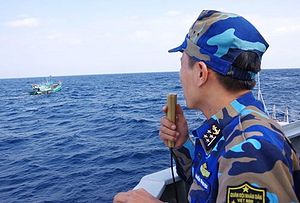Last week, Thailand and Vietnam held the latest iteration of their defense policy dialogue. Though this was just one of several interactions between the two fellow mainland Southeast Asian states, it nonetheless highlighted the role of defense cooperation in their bilateral ties as well as within their broader foreign policies.
As I have observed previously in these pages, despite a past legacy of animosity for much of the Cold War, contemporary bilateral ties between Vietnam and Thailand have included some defense collaboration as well over time. Defense ties between the two have covered a wide range of areas, from addressing transnational crimes to regulating fishermen within maritime boundaries, and there have been efforts to further strengthen ties in specific areas as well, including training and peacekeeping.
One of the key steps taken in this regard is the holding of a defense policy dialogue. The dialogue, inaugurated back in 2017, was meant to serve as a regular mechanism for both sides to discuss security issues of mutual interest as well as to structure defense collaboration between the two countries and the militaries.
Last week, the security aspect of ties was in the headlines again with the holding of the third Vietnam-Thailand Defense Policy Dialogue. The dialogue took place in Ho Chi Minh City on September 19, and it was co-chaired by Vietnamese Deputy Defense Minister Nguyen Chi Vinh and Permanent Secretary for Thailand’s defense ministry Natt Intracharoen.
The dialogue saw both sides discuss both the state of their overall defense relations as well as regional and international security issues of common interest. Per the official account of the dialogue by Vietnam’s defense ministry, the issues discussed included competition among major powers, maritime security, non-traditional challenges such as terrorism and transnational crime, and the role of the Association of Southeast Asian Nations (ASEAN), with Thailand holding the regional grouping’s annually rotating chair position this year and Vietnam doing so in 2020.
The two countries also discussed ways to further develop their defense relations. Per the ministry’s statement, among the areas that both sides agreed to further cooperation in included delegation exchanges, training, cooperation in United Nations peacekeeping, humanitarian mine action, anti-terrorism, and combating transnational crime.
Unsurprisingly, neither of the two countries disclosed much in the way of additional specifics publicly in relation to their private deliberations. Nonetheless, how both sides look to make inroads in the aforementioned areas of collaboration will be important to monitor to get a sense of how the rhetoric on defense cooperation is actually manifesting itself in reality.






























